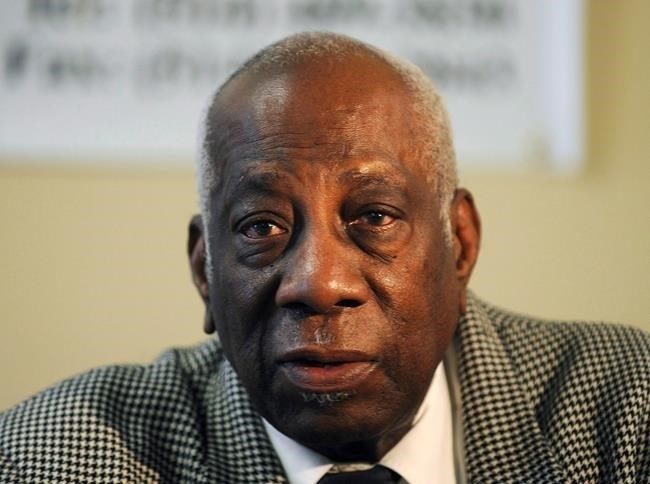
A Quebec cemetery where black slaves are believed to be buried should be formally recognized as a historic site, say a black rights group and some Montreal city councillors. President of the Black Coalition of Quebec, Dan Philip, speaks at a news conference in Montreal in a Jan. 15, 2010, file photo.
Image Credit: THE CANADIAN PRESS/Graham Hughes
October 02, 2016 - 7:00 AM
MONTREAL - A Quebec cemetery where black slaves are believed to be buried should be formally recognized as a historical site, say a black rights group and some Montreal city councillors.
Several loyalist families leaving the United States brought slaves with them when they settled near Saint-Armand around 1784, according to the Black Coalition of Quebec.
"We have written to the United Nations as well as the federal and provincial governments over the years asking that this site be preserved in memories of the sacrifices and contributions of the black community," said Dan Philip, the organization's president.
The site near the Vermont border is a rocky outcropping known as "Nigger Rock," and Philip says he is in favour of keeping the controversial name, despite the Quebec government deciding in 2015 to strip the word from all place names in the province.
"Changing the name won't change its history," he said. "I'm uncomfortable when people say that word, but we have to position ourselves vis-a-vis history as it was."
Some Montreal city councillors are adding their voices to the quest to get the site officially recognized as a national historical site.
They hope Parks Canada will choose to acquire part or all of the site, which is on private property, to create a monument the public can visit.
"The intention is for there to finally be some recognition given to this place," said Coun. Marvin Rotrand, who plans to introduce a bill asking the administration to support the activists' efforts.
Since the site is privately owned and has not been open for digging, evidence of a burial ground comes mostly from town records and oral history.
But whether the memorial is placed there or elsewhere in the town, Philip wants to raise awareness of the little-known history of slavery in Canada and the contributions of the black community to building the region.
"The impression we have (in Canada) is blacks came here to escape slavery in the U.S. by the railroads," he said. "We look at Canada like the saviours of the community, but that is not a complete history."
He points out there are records of slaves in Quebec dating to 1628, and with more than 200 in the province at one point.
Philip says the support of the Montreal councillors combined with encouraging signs from the federal government in recent months makes him hopeful his longtime goal of a memorial may finally be achieved.
News from © The Canadian Press, 2016